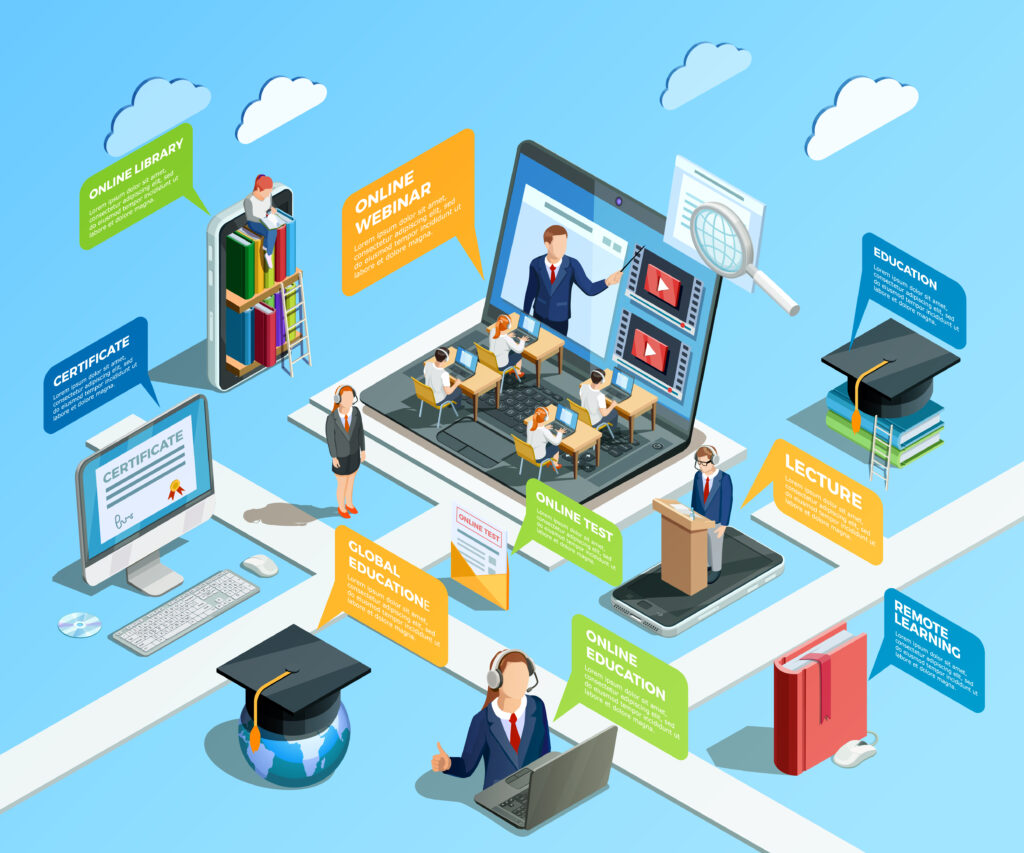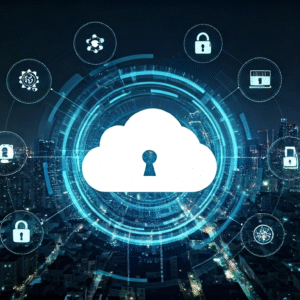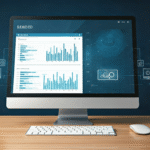Key Highlights
- Streamlined Data Management: School ERP software facilitates the optimization of administrative duties such as attendance tracking, fee collection, academic record maintenance, and financial data management, thereby minimizing manual labor.
- Operational Effectiveness: The automation of routine tasks boosts productivity and enhances the overall operational performance of educational institutions.
- Improved Communication: ERP systems promote effective communication among students, parents, educators, and school administrators, ensuring smooth interactions.
- Cost Reduction: Implementing School ERP systems leads to decreased costs associated with manual processes and paper documentation.
- All-in-One Software Solution: ERP offers a unified platform for the efficient management of student data, curriculum, human resources, and budgeting.
- Data Security: These systems safeguard sensitive student information and financial data against potential data loss or breaches.
Introduction
Managing educational operations can be quite challenging. Schools must balance administrative responsibilities such as fee collection, academic record keeping, and staff management while aiming to improve educational offerings. To effectively tackle these challenges, School ERP systems present a contemporary solution. A school ERP (enterprise resource planning) system integrates both administrative and academic functions into a cohesive platform, allowing schools to function seamlessly. This robust tool revolutionizes operations by automating tasks, eliminating redundancies, and enhancing overall efficiency. In the following sections, we will explore its features and importance.
Defining School ERP Systems
A School ERP system is an innovative enterprise resource planning software designed specifically for educational institutions. It integrates various administrative and academic functions, including human resources, fee management, and student performance monitoring, into a single platform. By removing the disjointed management of multiple tools, the system enhances operational efficiency.
In contrast to generic business ERP software, school ERP solutions are specifically tailored for K-12 institutions, providing specialized features that address their unique needs.
Core Components of a School ERP
School ERP software includes several vital modules designed to simplify and improve school operations.
Student Information Management
This module maintains student profiles, attendance records, progress reports, and academic documentation. By consolidating data in a single location, administrators guarantee consistent and readily accessible student information.
Fee Management
The processes for fee collection are streamlined through online payment options, automated reminders, and thorough tracking. Furthermore, budget management is enhanced by real-time financial insights.
Staff Management and Human Resources
School ERP systems efficiently handle staff-related administrative tasks, from attendance tracking to payroll processing. Additionally, the management of teachers’ certifications and evaluations can be conducted effectively.
Academic Records
The management of curriculums, examination schedules, grading, and report cards is made more efficient, allowing educators to concentrate on educational excellence rather than administrative burdens.
This technology is revolutionizing traditional operational models into digital success stories.
How School ERP Differs from Traditional Management Methods
Simplifying Administrative Procedures
Traditional methods relied significantly on manual data entry, which increased the likelihood of human error and inefficiency. With School ERP, operations such as managing fee records or academic schedules are automated, ensuring accuracy and saving time.
Replacing Paper-Based Records
Paper records are difficult to manage, susceptible to misplacement, and not environmentally friendly. Contemporary ERP systems guarantee that data is stored digitally, providing immediate access while minimizing physical clutter.
Boosting Operational Efficiency
In contrast to traditional methods that feature isolated departments, ERP systems integrate processes across various areas such as curriculum management and payroll. This interconnected environment removes redundancies and boosts productivity, making every administrative task more seamless.
Thus, the adoption of an ERP system ensures that schools operate more smoothly.
Key Features of School ERP Software
School ERP software provides essential features that render it a holistic software solution. It consolidates processes such as fee management, student information tracking, and academic progress reporting. This integration enables schools to efficiently oversee all operations within a unified platform.
Other notable features encompass remote accessibility, allowing parents and stakeholders to monitor academic progress and financial reports at any time. From budget management to automated attendance tracking, every element of the ERP system aids in streamlining administrative tasks while ensuring data security.
Student and Academic Information Management
The management of student information is fundamental to any effective ERP system. From admissions to progress tracking, a school ERP serves as a comprehensive solution for organizing student academic records and personal information.
Tracking Attendance and Curriculum Progress
Automated attendance systems minimize paperwork, guaranteeing precise tracking. Educators benefit from streamlined tools for managing lesson plans and curriculum timelines.
Generating Report Cards & Feedback
Report cards and progress reports are produced digitally with a simple click, reducing errors and enhancing the prompt delivery of feedback to students and parents.
Centralized Repository
All student-related information is securely stored in one location, providing administrators with immediate access to facilitate informed decision-making. This framework significantly enhances daily administrative operations.
This component is crucial for efficiently managing routine academic functions while fostering continuous growth throughout the school.
Fee Collection and Financial Administration
Managing school finances is made easy with ERP systems. These systems automate the collection of fees and streamline financial management.
Efficient Fee Payment Methods: Parents have the option to make secure online payments, eliminating the need for queues and providing real-time transaction tracking.
Budget Evaluation: Such systems enable schools to leverage sophisticated financial data tools for budget assessment and effective resource management.
Transparency and Reporting: The use of digital records and automated processes reduces inconsistencies, thereby improving accountability.
By utilizing ERP software, schools not only reduce operational mistakes but also achieve complete clarity regarding their financial status, facilitating well-informed future planning.
Improving Communication Among Stakeholders
Fostering Effective Communication
ERP software brings stakeholders together by offering platforms for consistent engagement. Teachers, parents, and administrators remain connected via timely updates and feedback mechanisms.
Transparency Across School Community
Parents access progress reports, attendance records, and fee details in real-time. This inclusive system ensures everyone stays informed and involved, building trust.
Providing Timely Interaction
Features like messaging tools and parental portals ease communication. Teachers can share updates instantly, ensuring collaboration runs smoothly among the school community.
Improved communication leads to a stronger partnership between schools and families, promoting educational success in efficient, structured ways.
School ERP vs. Other Educational Management Solutions
School ERP systems differ significantly from other educational management solutions. These platforms integrate a wide range of functions, from administrative to academic management, within one system. In contrast, other solutions may specialise in isolated areas like financial operations or student databases.
The ERP system stands out for offering comprehensive features tailored specifically to school environments. Addressing unique challenges in K-12 education, ERP systems ensure smooth and efficient processes across school departments. This distinction makes them preferable to fragmented alternatives.
Distinction Between School ERP and SIS
Aspect | School ERP | Student Information System (SIS) |
|---|
Core Focus | Covers administrative, financial, and academic tasks | Primarily centers on managing student data |
Modules Included | Human resources, fee management, academic tracking | Student profiles, attendance, report cards |
Comprehensive Features | Offers broader functionality beyond academics | Dedicated to academic records only |
Integration | Connects various departments into one platform | Focused on individual academic modules |
Schools gain a holistic resource through ERP systems, unlike the narrower scope of SIS, maintaining both versatility and efficiency.
Comparing School ERP with Business ERP
Business ERP systems and School ERP software serve distinct environments, yet share functional similarities.
School ERP Adaptability
Tailored specifically for educational contexts, School ERP software integrates processes like payroll, attendance, curriculum schedules, and finance while observing compliance with educational regulatory standards.
Business ERP Focus
These systems cater to corporate needs such as product management, marketing, and supply chain operations, offering fewer features relevant to educational institutions.
While both systems strive for operational efficiency, the comprehensive features of School ERP make it indispensable for K-12 schools aiming for precise academic and administrative management.
Conclusion
In conclusion, adopting a School ERP system can significantly enhance the education management experience for institutions of all sizes. By streamlining processes like student information management, fee collection, and communication among stakeholders, schools can achieve greater operational efficiency and productivity. The transition from traditional management methods to a more integrated approach not only saves time but also allows educators to focus on what truly matters – providing quality education. If you’re ready to explore how a School ERP can transform your institution, don’t hesitate to reach out. Get a free consultation to find the best solution tailored to your school’s needs.
Frequently Asked Questions
What types of schools can benefit from using a School ERP?
School ERP software suits all types of schools, including K-12 institutions and private academies. By integrating academic records and administrative procedures, it empowers school owners and staff members to manage operations efficiently while improving the learning experience for students.
Is School ERP software secure for sensitive data?
Yes, School ERP software ensures robust data security protocols to protect sensitive student data from breaches or loss. It employs stringent information management systems and advanced measures to guarantee the integrity and safety of all institutional records.
How long does it take to implement a School ERP system?
Implementation timelines for School ERP systems vary based on scale. Generally, proper planning, initial investment, and best practices ensure smooth and timely integration. Most systems require a few weeks of setup before becoming fully operational for administrative tasks.
Can parents access information through School ERP?
Absolutely! Parents can use School ERP systems to track student progress, view report cards, and monitor attendance. This effective communication ensures parents remain engaged, fostering an environment of accountability and transparency in education.
What support is available for schools adopting a new ERP?
Schools implementing ERP systems receive extensive support. Vendors generally offer training, technical assistance, and troubleshooting for school administrators. These resources help staff navigate critical tasks effortlessly, ensuring new adopters experience smooth transitions.















